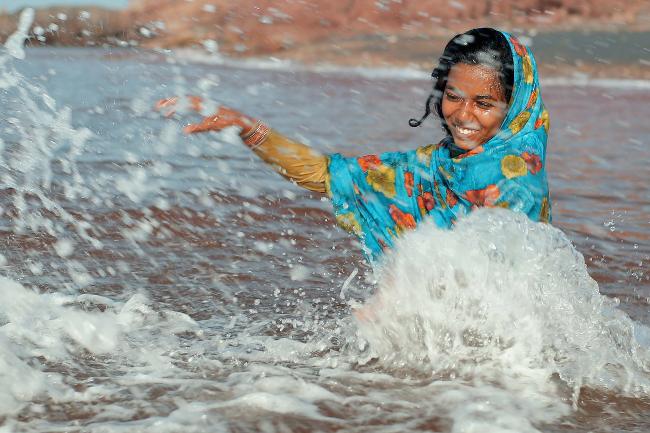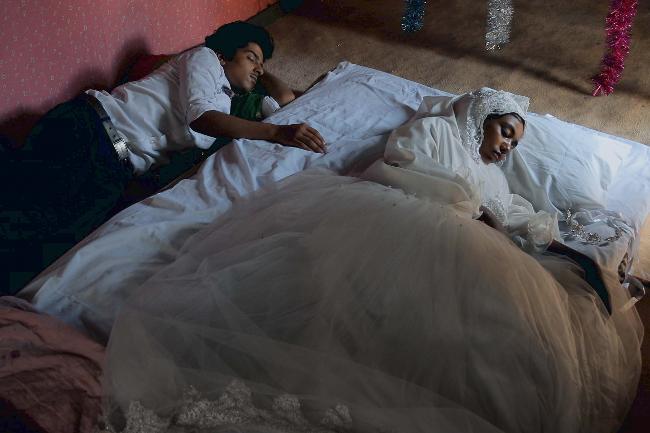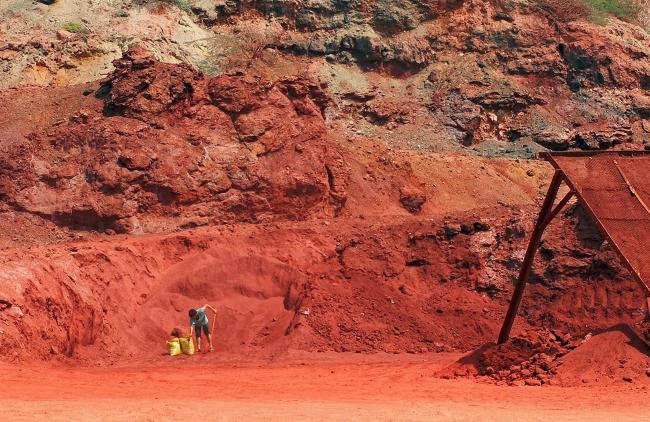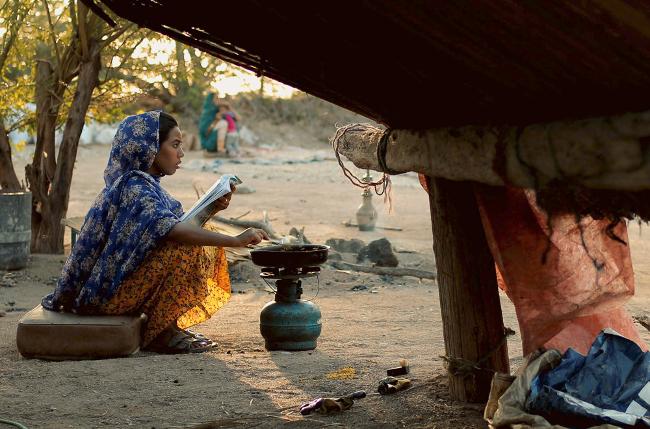4-23-19
Hendi and Hormoz Highlights UCLA Celebration of Iranian Cinema
By Diane Sippl

Presented by UCLA Film & Television Archive and Farhang Foundation Sunday, April 28th at 7 pm at the Billy Wilder Theater in the Hammer Museum in Westwood, Hendi and Hormoz, from the first frame to the last, fills us with awe that wafts through it like a Persian perfume from the country’s southern shores. The tiny Iranian isle of Hormuz looks like a magical gem, but actually, it really is a “Rainbow Island” that peeks out as if dotting the “i” on the peninsula of Dubai across the strait in the Emirates. The screen lures us with carmine sands bleeding into the minty aqua sea at the base of salt mountains and crystal caves. This is not to exoticize the characters in director Abbas Amini’s feature film, a tale of young love as universal as it is mesmerizing.
Hendi wants an education as much as any other girl today, and Hormoz is expected to make a living to support them as in any other family. Neither struggle is easy, and all is made more difficult by the fact that she is only 13 and he only 16. Minerals and ores draw Hormoz to the mines where his uncle works, but the boss is vitriolic and brutal. There is money in the ochre soil, and smugglers would have Hormoz take the risk in night-time deliveries by boat, but the waters are heavily policed, and the inexperienced boy makes the wrong snap decision, causing him to lose the precious cargo.

His motor bike could bring him money transporting tourists around the island if only there were enough of them soon enough, but meanwhile, Hendi, his sensuous bride, who wedded him in the opening shot of the film but rejected his mandatory advances on their first night, has taken a liking to him. They swim and frolic at the shore and Hormoz builds a campfire in the sand. “Don't cook food--the jinns will come,” warns Hendi, referring to the mythic Arabian demons that could possess them. Their romantic encounter on the beach under the stars seriously complicates their tender young marriage. “Go to the market and get her some mangos and pistachios,” Hendi’s mother scolds Hormoz when, the next morning, she discovers his irresponsible behavior with her daughter, and its consequences.
The smugglers require compensation for the transaction Hormoz bungled and demand that he serve their prison sentence for them. Hendi will hear nothing of it. Then, as in filmic tales of poverty from Murnau’s Tabu to De Sica’s Bicycle Thieves, Hormoz decides to fend for himself by any means necessary, shoveling the red ochre into his own bags, and Hendi teaches him to shout the words “I sell soil” from his small boat as the big export ships approach in the harbor.

As Hendi and Hormoz face the storms of life in their otherwise idyllic youth, we might also note that the island paradise of Hormuz, known as a “geological wonderland” ever since Marco Polo’s visit in 1290 and its Portuguese capture in 1590 before the English East India Company found it lucrative in 1622, is still a strategic point in world commerce today. As this article gets posted, U.S. President Trump, deeming Iranian Revolutionary Guards a terrorist group, threatens to block the strait between the Persian Gulf and the Gulf of Oman (and the Arabian Sea) with Hormuz at its gate, through which 20 percent of the world’s oil supply flows.
Hendi and Hormoz allows viewers the rare chance to discover who actually lives on this island that others might consider a mere dot on the map of the world’s economic interests. Director and co-writer Abbas Amini puts a face—in fact, two strikingly handsome faces—on a culture seldom seen in world cinema, vivid and vital as the daily life is and talented as the filmmakers are. Born in 1983 and raised in Abadan, in the heart of Iran’s oil fields, the region most hit by the Iran-Iraq War of 1980-88, Amini is no stranger to either the southern region or to the plight of children growing up there during and after the war.
Having worked for the Association for the Protection of Child Labourers for a decade now, which educates underprivileged children and improves their skills and living conditions, he has made numerous documentaries on social and child welfare issues. His first fiction feature, Valderama (2016), addressed the needs of a 15-year-old boy from the south of the country who flees from aggression to Tehran and fights for his survival with no identity card and therefore no health or educational or social rights and no protection from the harsh forces surrounding him.

Hendi and Hormoz, Amini’s second fiction feature, draws perfectly natural performances from its young actors, Hamed Alipour as Hormoz and Zohreh Eslami as Hendi. Mehran Ghaedipour’s enchanting music and songs encapsulate the local culture and the mood, with Ashkan Ashkani’s lighting/photography and Azadeh Moussavi’s set/costume design both authentic and dazzlingly colorful at once. No viewer wants to escape the atmosphere they create, even when Amini and co-writer Hossein Farrokhzadeh show us both the dream and the despair that walk hand-in-hand in this unforgettable land.
Hendi and Hormoz
Director: Abbas Amini; Producers: Abbas Amini, Pouria Heidari; Screenplay: Hossein Farrokhzadeh, Abbas Amini; Cinematographer: Ashkan Ashkani; Editor: Shahrooz Tavakol, Ehsan Vaseghi; Sound: Mehrshad Malakooti; Music: Mehran Ghaedipour; Production/Costume Design: Azadeh Moussavi
Cast: Hamed Alipour, Zohreh Eslami, Asma Daneh-chin, Agha Mohammad.
Color, Cinemascope, 88 min., Persian with English subtitles.